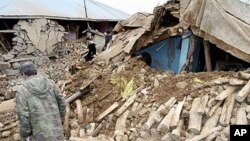The powerful earthquake that struck Turkey Monday is a tragic reminder the country lives in the shadow of devastating natural disaster. The 14 million people living in Istanbul are waiting for what is known there as, "The Big One."
A Turkish television program remembering the victims of the 1999 earthquake that struck just east of Istanbul. The temblor killed more than 17,000 people, and experts warn a powerful quake could strike central Istanbul at any time.
Professor Ahmet Ercan, head of Turkey's Geophysical Society, says he is expecting one centered 20 to 25 kilometers south of the city, estimated at 6.3 to 6.7 magnitude. But he says the destructive force of the earthquake could be felt to be around seven to eight magnitude in certain parts of the city, because of the geology. He says an earthquake there could also cause tsunamis.
Istanbul is no stranger to devastating quakes, being struck by 15 in the past 16 centuries. The last was in 1894. Istanbul city authorities are working hard to prepare for the next quake.
The city official responsible for housing, Hasan Atas, is devoting nearly all his time to purging the area of dangerous buildings, but he acknowledges he is facing an uphill battle.
He says in just three neighborhoods there are 600 dangerous buildings in imminent danger of collapsing, and another 3,000 that should be destroyed. He says every month a building collapses in Istanbul, especially when it is very wet or snowing. He says if there is an earthquake under those conditions it would be a catastrophe.
But it is not only old buildings that are at risk. On one of Istanbul numerous construction sites a new apartment block is being erected to meet the ever-growing demand for housing. For more than a decade about 500,000 people a year have moved to the city, generating a huge demand for cheap, quick housing.
But as architect Ekim Kaptan explains that has lead to fatal corner cutting.
"In Turkey, all the building codes are very similar to any building codes in America and Europe. The problem is no one obeys these rules these days," said Kaptan. "There [has to be] a certain amount of iron percentage to concrete, [but] most of the time to cut down cost they do not use enough metal. Also they put [in] just enough cement to cut cost down. Most of these buildings are not done by engineers, most of them are illegal."
Speaking to people in the center of Istanbul, nearly everyone appears to be aware of the threat facing them.
PERSON 1: "Out of control, without any rules. They do not obey rules and then when there is an earthquake all of them, 'Ohhhhh so bad.' I am living in an apartment, four flats there are, and I am the fourth. For me I call myself 'Chancy' because it is top and there is nothing [to] destroy me, only the roof, but I am worrying about the rest."
PERSON 2: "I hope [where] I am living is safe… All the architects, the people who build buildings, make really make big mistakes, so the buildings can collapse by themselves also."
Such concerns are well founded, according to Professor Celal Sengor of Istanbul Technical University. He has been studying the possible impact of a large quake on Istanbul and paints a grim picture.
"When the earthquake hits, part of these buildings will fall down, people will be trapped in them. Some of them people will not be able to get out. Some of these streets have natural gas pipelines going under them, they will burst, you will have fires rising [as] people try to run away. There will be ruins, they will try and clamber up, rescue units will try [to] reach [them]. It will be complete mayhem in Istanbul," noted Professor Sengor.
Experts say the expected quake could strike at any time. Istanbul authorities say they are taking measures to secure the population of 14 million people, but with many living in illegally or poorly constructed housing the size of the task appears overwhelming.








